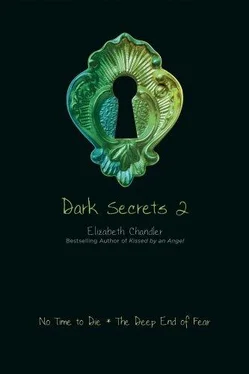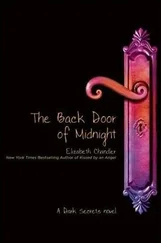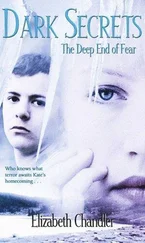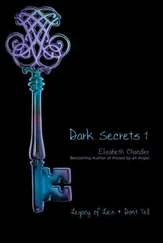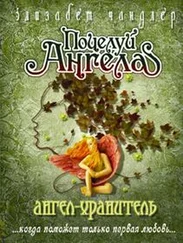Элизабет Чандлер - Don't Tell
Здесь есть возможность читать онлайн «Элизабет Чандлер - Don't Tell» весь текст электронной книги совершенно бесплатно (целиком полную версию без сокращений). В некоторых случаях можно слушать аудио, скачать через торрент в формате fb2 и присутствует краткое содержание. Жанр: Фэнтези, на английском языке. Описание произведения, (предисловие) а так же отзывы посетителей доступны на портале библиотеки ЛибКат.
- Название:Don't Tell
- Автор:
- Жанр:
- Год:неизвестен
- ISBN:нет данных
- Рейтинг книги:4 / 5. Голосов: 1
-
Избранное:Добавить в избранное
- Отзывы:
-
Ваша оценка:
- 80
- 1
- 2
- 3
- 4
- 5
Don't Tell: краткое содержание, описание и аннотация
Предлагаем к чтению аннотацию, описание, краткое содержание или предисловие (зависит от того, что написал сам автор книги «Don't Tell»). Если вы не нашли необходимую информацию о книге — напишите в комментариях, мы постараемся отыскать её.
Don't Tell — читать онлайн бесплатно полную книгу (весь текст) целиком
Ниже представлен текст книги, разбитый по страницам. Система сохранения места последней прочитанной страницы, позволяет с удобством читать онлайн бесплатно книгу «Don't Tell», без необходимости каждый раз заново искать на чём Вы остановились. Поставьте закладку, и сможете в любой момент перейти на страницу, на которой закончили чтение.
Интервал:
Закладка:
Planting my hands on the dock, I swung my feet up onto it, as if climbing onto a three-foot wall. I stood up slowly, my eyes traveling the length of the T-shaped walkway, then shifting to the far left side, to the piling where my mother had struck her head.
She may have been drinking. It was easy to trip on the uneven planks. The tide was high that night, the water just over her head. It took so little for a person to die. Aunt Jule had told me over and over that it was nobody’s fault.
And yet, I felt responsible. My mother had refused to let me visit Aunt Jule that last summer. But the more clingy she had become, the more desperate I’d been to get away from her. I had thrown fierce tantrums until she gave in-gave in with the condition that she would accompany me. If I hadn’t argued, if we hadn’t come, would she still be alive?
I couldn’t walk to the end of the dock, not yet. I jumped down and climbed the hill to the house.
My mother had become even worse in Wisteria, still clinging, not wanting me to play with Nora and Holly. She would blame them for things. She’d tell me I was too good for them, and say it in front of them. Poor Holly had been caught between snubbing me entirely and acting like my best and dearest friend — just to get my mother riled.
Both Holly and Nora had fought back with words, showing the anger that I myself felt but tried to hide. Then Mommy drowned. What do you do with your anger when the person you’re mad at goes off and dies? Bury it? Bury it inside you?
I circled the house to see the gardens, hoping they could still give me the peace I had felt there as a child. I passed my favorite tree, a huge old oak with a swing. Someone had lassoed the high branch with a new rope. The gardens, too, had been cared for and looked better than they had seven years ago. My heart lightened.
A greenhouse stood not far from the garden, a long rectangular structure with a gambrel roof, built in the 1930s on the brick base of an earlier one. The roof vents were up and the door open.
When I peeked in I found Nora tending plants halfway down the main aisle, on one of the short cross aisles.
Focused on her work, her fingers moving deftly among the shiny leaves, she didn’t notice me. I stepped inside the door and she looked up. Her eyes darted fearfully around the greenhouse. I thought that she had heard me enter, but her gaze passed over me as if I were invisible. I, too, looked around, wondering what she sensed.
She started to tremble and shook her head with quick, jerky motions. It was as if she had something frightening inside it that she was trying to shake out. I remembered as a child how she hated getting water in her ears and would become frantic to get rid of it. I watched silently, afraid to speak and upset her more.
The shaking finally stopped, the fear in her easing into a quiet wariness. She tended her plants, neatly removing yellow leaves. I surveyed the greenhouse again. There was nothing there — nothing that I could see — triggering her emotions; whatever Nora was reacting to was deep inside her.
“Hi, Nora.”
This time when she looked up, she saw me. “I don’t want you here.”
I walked toward her. “Here in the greenhouse or here at your mother’s?”
She didn’t answer.
“Why don’t you want me around?” I asked.
She moved on to another bench of plants and began to snip off their tops.
“Nora, why don’t you like me anymore?”
“I don’t remember.”
“Please try to.”
She pressed her lips together and nervously fingered dark strings of hair. I wished Aunt Jule would make her wash it.
“I’m busy,” she said, “I have to cut off their little heads. It hurts them. They hate it, but they will be better for it.”
“You mean you’re pinching back the plants so they’ll grow bushier?” I asked.
“Do you want to see my vines?” she replied.
I wasn’t sure if she was too mentally scattered to answer my questions or simply unwilling. “Sure.”
She led me outside and showed me several trellises standing against the southern wall.
“It gets too hot in the summer, so I use the climbers to shade the plants inside. These are morning glories,” she said, pointing to the heart-shaped leaves. “And over there is Lauren.”
“Laurel?” I asked, misunderstanding her. “It looks like a climbing rose.”
“It is. I named her Lauren.”
“Oh.” I wondered if it was a coincidence that she had given the plant my name. “Then we’re called the same thing,” I remarked cheerfully.
But Nora was frowning now, the vertical crease between her eyes deepening, the troubled world inside her more real to her than the one outside.
“Will you get me some fishing line?” she asked. “I use it to tie up Lauren. Morning glories will twine themselves. But roses have to be tied or else their arms will fall and strike you, and their thorns will make you bleed.”
I mulled over her strange way of describing her work, trying to understand what lay behind the words.
“There’s fishing line in the boathouse. Will you get it?” she asked. “I don’t go in there. It’s full of water.”
“No problem,” I said.
“You’ll need the key.”
“It’s locked? Why?’ I asked.
Nora twisted her hands. “Because she’s in there. She goes there to sleep during the day.”
“Who?”
“Sondra.”
My breath caught in my throat. “You mean my mother?
She’s dead.”
“She sleeps there during the day,” Nora replied. “Be quiet when you go in or you will wake her.”
She was serious. A chill went up my spine.
“I’ll show you where the key is,” Nora said, walking backward a few steps, then turning to hurry on.
About thirty feet from the boathouse she stopped.
Standing next to her, I surveyed the old building, which was nestled in the bank where the river curved, straddling the border between Aunt Jule’s and Mr. Frank’s property. The boathouse had deteriorated badly. Its roof buckled, two shutters hung off their hinges, and many of the wood shingles were broken. As far back as I could remember, there hadn’t been a boat in the house. We used to put our crab traps there and fish off its roof. Now we’d probably fall through.
“Do you see her?” Nora whispered.
“No.”
“She’s asleep,” Nora said, her voice barely audible. “All night she swims out by the dock, then she comes here at dawn. She wants to stay in the darkness.”
“That makes no sense,” I replied in a voice too loud. “Why would she do that?”
“She’s looking for her little girl.”
My throat felt tight when I swallowed. I strode ahead and found both the land entrance and the doors to the river closed and padlocked. The shutters were loose, but the windows were boarded up.
“Where’s the key?” I asked.
“On a hook behind the shutter,” Nora said, hanging back.
I found the key and unlocked the padlock. Nora crept closer. I laid the padlock on the ground, pulled back the latch, then opened the door.
After being in the bright sunlight, I couldn’t see a thing.
Cautiously I stepped inside. The smell of stagnant water, earth, and rot was overwhelming. It wouldn’t be hard to believe that someone was dead in here.
I remembered there was a narrow walkway lining three sides of the building, surrounding the area of water where a boat would float. Along the wall to the right there used to be a light with a pull-chain. I felt my way toward it.
“Where’s the line kept, Nora?” I called out to her.
“In the loft,” she answered softly.
Great. I’d probably climb into a rat colony. But I went on, hoping that in helping Nora I’d win her trust, as well as prove to her that my mother wasn’t here. I felt the beaded chain and yanked down hard. Nothing. I reached up and touched an empty socket.
Читать дальшеИнтервал:
Закладка:
Похожие книги на «Don't Tell»
Представляем Вашему вниманию похожие книги на «Don't Tell» списком для выбора. Мы отобрали схожую по названию и смыслу литературу в надежде предоставить читателям больше вариантов отыскать новые, интересные, ещё непрочитанные произведения.
Обсуждение, отзывы о книге «Don't Tell» и просто собственные мнения читателей. Оставьте ваши комментарии, напишите, что Вы думаете о произведении, его смысле или главных героях. Укажите что конкретно понравилось, а что нет, и почему Вы так считаете.
